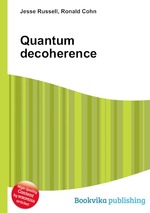Quantum decoherence
Jesse Russell Ronald Cohn
бумажная книга
High Quality Content by WIKIPEDIA articles! In quantum mechanics, quantum decoherence is the loss of coherence or ordering of the phase angles between the components of a system in a quantum superposition. One consequence of this dephasing is classical or probabilistically additive behavior. Quantum decoherence gives the appearance of wave function collapse (the reduction of the physical possibilities into a single possibility as seen by an observer) and justifies the framework and intuition of classical physics as an acceptable approximation: decoherence is the mechanism by which the classical limit emerges out of a quantum starting point and it determines the location of the quantum-classical boundary. Decoherence occurs when a system interacts with its environment in a thermodynamically irreversible way. This prevents different elements in the quantum superposition of the system+environment`s wavefunction from interfering with each other. Decoherence has been a subject of active research since the 1980s.


